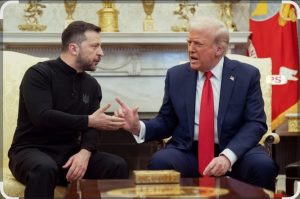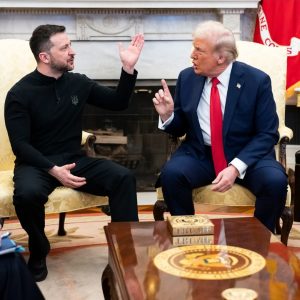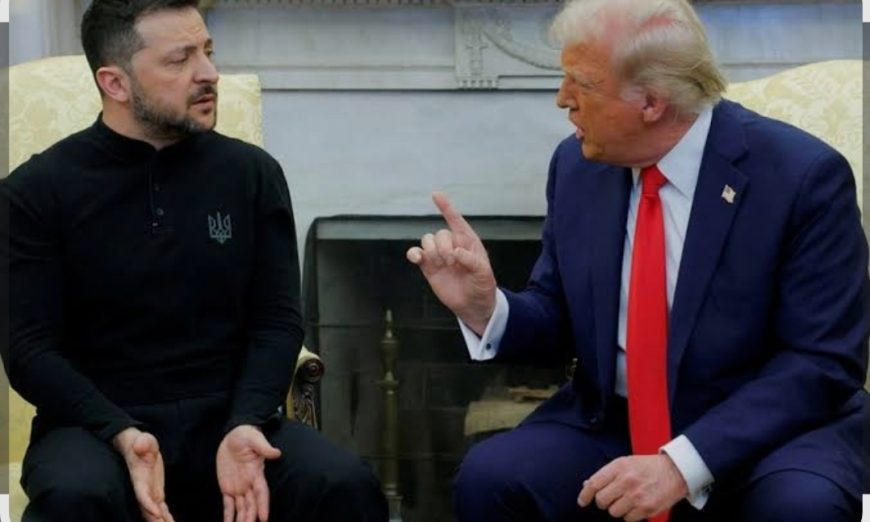THE recent confrontation between U.S. President Donald Trump and Ukrainian President Volodymyr Zelensky at the White House has sparked global reactions, exposing deep geopolitical tensions and shifting alliances. What was meant to be a diplomatic meeting turned into a heated exchange, highlighting Trump’s transactional approach to foreign aid and Ukraine’s struggle for sovereignty amid its ongoing war with Russia. In this article, Tanzanian analyst GODLISTEN MALISAunpacks the dramatic Oval Office encounter, its implications for U.S.-Ukraine relations, and the lessons it offers about power, diplomacy, and global politics. Read on:

I am still reflecting on what happened yesterday in the Oval Office at the White House in Washington, D.C. It is worth remembering that the United States has been a major ally of Ukraine in its war with Russia.
Ukraine has received significant financial and military aid from the U.S. to fight against Russia. The funds approved by Congress from 2022 to 2025 amount to $174 billion, equivalent to TZS 451 trillion—about the same as Tanzania’s national budget for ten years. Although Trump claims the figure is $350 billion, official reports confirm it is $174 billion.
Trump has a different approach to U.S. foreign policy. Everything in his mind revolves around money. That is why he even cut USAID assistance to poor countries because he does not see how the U.S. benefits from giving out such funds. It should be noted that Trump is a businessman, and in business, nothing is free. If you give something, you must get a return with profit.
This is why he wants to revoke birthright citizenship and introduce citizenship by payment. If he succeeds (though it is constitutionally difficult), it means that if you want to live in the U.S. as a citizen, you will have to pay $5 million (TZS 13 billion). The game of getting pregnant in Nyakanazi and giving birth in Texas to secure U.S. citizenship for your child would be over. If you go there while pregnant, Trump wants you to pay TZS 13 billion to stay as a citizen and have your child born as an American. If you can’t afford it, take your pregnancy back to Rombo Mamsera.
Anyway, Trump now claims that the U.S. has already spent too much money supporting Ukraine. So, how will it be repaid? He set conditions that he must be granted rights to mine rare earth minerals found in Ukraine (lanthanum, erbium, and yttrium). These minerals, essential in electronic devices and space science equipment, are scarce worldwide, with a significant portion found in Ukraine. The U.S. desperately needs these minerals for its aerospace technology, especially since Elon Musk has become an integral part of Trump’s administration.
So, Trump conditioned continued U.S. support for Ukraine on Ukraine allowing the U.S. to mine these minerals. It was a tough decision for Zelensky, but he had no choice—he had to agree. Yesterday was supposed to be the signing ceremony for the agreement.
When Zelensky arrived at the White House, a journalist mockingly asked him, “Why, as a president, don’t you wear a suit?” Zelensky responded, “How can I seek the luxury of clothing when my people are dying and my country is soaked in blood?”
The journalist mocked him again, saying, “You are the highest-ranking public official in your country, so why do you dress like someone without status?” Zelensky replied, “When the war ends and my country is at peace, perhaps I will wear a suit like yours. But for now, I cannot seek elegance while my people do not know what tomorrow holds.”
By then, Zelensky was already unsettled. When official talks began, Trump and his Vice President, JD Vance, seemed to compete in provoking Zelensky. Trump listed all the aid the U.S. had provided to Ukraine and accused Zelensky of never expressing gratitude. He told him that without the U.S., Ukraine would have been crushed by Russia within two weeks. Provoked, Zelensky responded, “You say two weeks, but Putin said three days—yet this is the third year, and we are still fighting.”
Trump, now irritated, replied, “You are fighting because of our strength; alone, you would have been defeated in those three days. If Putin stops fighting, the war ends. But if you stop fighting, Ukraine ceases to exist. That’s why we help you.”
As the argument escalated, JD Vance accused Zelensky of campaigning for their opponent (Kamala Harris) in Pennsylvania during the elections but never campaigning for them (Trump and Vance). Zelensky attempted to defend himself, but Vance cut him off and insisted that he should apologize and show gratitude; otherwise, he should not even be at the White House. Zelensky responded that he was grateful for all that the U.S. had done for Ukraine and could never overlook America’s support.
Trump then pressured Zelensky to lay down arms to end the war. Zelensky said he was ready to do so but questioned what would happen to the regions of his country occupied by Russia—Donetsk, Luhansk, Zaporizhzhia, Kherson, and Crimea, which Russia had seized since 2014. Should he surrender while his country is invaded and plundered?
At that point, Ukraine’s Ambassador to the U.S., Oksana Markarova, broke down in tears. She could not bear watching her president being treated like a pawn and humiliated in public.
Following the heated exchange, the meeting was abruptly ended. Everyone was in disarray. The mining agreement, which was set to be signed, was scrapped. The planned dinner was boycotted, and the prepared food was left for White House staff. The scheduled press conference was canceled. Zelensky was given only two hours to leave U.S. soil—he was expelled like a criminal.
However, before leaving, JD Vance followed Zelensky and insisted that he must publicly express gratitude to the U.S. for helping him in the war. Zelensky replied that he had always thanked the U.S. Vance countered, saying, “You thanked President Biden, but you have not publicly acknowledged President Trump.”
After leaving, Zelensky tweeted:
“We express our gratitude to the U.S. for their support. I thank President Trump, Congress, and all American citizens for standing with us, especially during these three years of war. The American people have helped save our citizens’ lives. Humanity and human rights have been the foundation of our partnership. I am deeply grateful.”
Following the White House drama, many world leaders have expressed disappointment. The European Union has declared its solidarity with Zelensky. Several individual nations have also publicly voiced their support for Ukraine in this conflict. Israel openly stated this evening that it stands with Ukraine. President Zelensky continues to receive messages of encouragement and support from various governments.
MyTake: The conflict between Trump and Zelensky teaches us the following:
Trump’s friendship with Putin is stronger than the U.S. government’s relationship with Ukraine. Read that again if you didn’t understand.
Trump has a business-oriented mindset. While Zelensky thinks about winning the war and liberating his country, Trump thinks about how he can profit from the war. How will the money given to Ukraine be recovered? How can he acquire Ukraine’s minerals? One man’s misfortune is another man’s opportunity.
Post-election trauma. Trump’s team still resents Zelensky for campaigning for Kamala Harris. But they forget that Zelensky had no choice. At that time, the U.S. government was run by Democrats, who provided him with all the war funds. When they invited him to their campaign, could he have refused? If Kamala had won, Zelensky would have been welcomed as a hero at the White House yesterday.
Trump is dissatisfied with the vast amount of money the Biden administration allocated to Ukraine’s war effort. He believes there was fraud involved, which is why Biden approved the funds without scrutiny. This frustrates him, and yesterday, he openly expressed his anger by calling Biden “Stupid Joe.”
Trump forgot that he was talking to another president, not a classroom monitor. Unfortunately, he did not accord Zelensky the respect he deserved from the start. It was as if he was talking to his farmhand. He forgot that, although the U.S. is a superpower, in matters between nations, sovereignty is equal.
In 1974, when Uhuru Kenyatta was in Form 1 at St. Mary’s Nairobi, he got into a fight with another student. He said, “I will call my father to deal with you.” He went to the headmaster’s office and was given a phone. He explained that a fellow student had hit him. Jomo Kenyatta told him, “Learn to fight your own battles,” and hung up. Uhuru says that after that, he lived without depending on his father’s presidency. When a problem arose, he solved it himself. Ukraine and other nations must learn this lesson. Many depend on the U.S. as their godfather, but when the U.S. turns against them, they are left helpless. Learn to fight your own battle!










